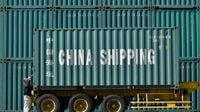In a significant shift, Chinese exporters are increasingly turning their focus inward, seeking to capitalize on the vast domestic market as external pressures from U.S. tariffs mount. This pivot comes as companies like Yangshi New Material Co., Ltd. and Anhui Good Hope Baby Safety Technology Co., Ltd. adapt their strategies to thrive amid changing trade dynamics.
During a recent livestream event on May 2, 2025, a salesperson from Yangshi New Material Co., Ltd., based in Shaoxing, highlighted the advantages of their outdoor clothing materials to a Chinese audience. The company's management, represented by Zhang Bin, emphasized the strength of the domestic market, stating, "We have a huge domestic market of 1.4 billion people. This gives us the greatest confidence in times of external disruptions," as reported by Xinhua.
This shift towards domestic sales is not an isolated phenomenon. Anhui Good Hope Baby Safety Technology Co., Ltd. reported a remarkable 25-percent growth in first-quarter sales this year, showcasing the resilience of Chinese firms amid fluctuations in foreign markets. The company’s ability to cater to both domestic and international demands has been integral to its success.
In response to the ongoing trade tensions, the Chinese government has implemented supportive measures for exporters. The Ministry of Commerce has actively engaged with industry associations, major retailers, and distributors to expand domestic sales channels for export-oriented firms. This initiative aims to help companies navigate the challenges posed by U.S. tariff hikes, which have prompted many to seek new opportunities within China.
As part of these efforts, quality export products are being introduced into supermarkets and online retail platforms nationwide. E-commerce giant JD.com has taken a proactive stance, establishing a procurement fund of 200 billion yuan (approximately 27.77 billion U.S. dollars) to bolster the purchasing of export-oriented products over the next year. Reports indicate that at least 30,000 companies have reached out to JD.com for collaboration, with thousands entering substantive negotiations.
Tencent, the owner of WeChat, has also launched the "Foreign Trade New Journey Boost Plan," designed to enhance the sales of foreign trade companies by facilitating access to both domestic and foreign markets through ten strategic measures. These include providing green channels for store openings, incentives for new merchants, and traffic support. Tencent estimates that this initiative could increase sales for foreign trade companies by 100 billion yuan.
Other e-commerce platforms, such as Meituan, Douyin, Kuaishou, and Vip.com, have similarly announced initiatives to support exporters in adapting to the domestic market. Retailers like Freshippo, Yonghui, CR Vanguard, and Lianhua are also contributing by helping export products reach Chinese consumers.
Tu Xinquan, dean of the China Institute for WTO Studies at the University of International Business and Economics in Beijing, noted that the push to assist foreign trade enterprises in expanding domestic sales is not merely a temporary measure. Rather, it is part of a broader transformation as China seeks to build a new development pattern. In 2024, nearly 85 percent of Chinese exporters were engaged in domestic sales activities, highlighting this significant shift.
Experts are optimistic about the future of Chinese exporters as they tailor their products for the home market and integrate advanced technology. Shao Honghua, director of the trade digitization committee of the Statistical Society for Foreign Economic Relations and Trade of China, acknowledged that while some foreign trade enterprises may encounter challenges due to differing market demands, industry associations and platforms are providing timely support.
Hong Junjie, a special advisor to the national committee of the China Council for the Promotion of International Trade, pointed out that many foreign trade commodities can meet the diverse consumption demands within China, potentially leading to new market opportunities and consumption upgrades. Qiao Liang, who oversees research and development at a Suzhou-based robotic pool cleaner manufacturer, expressed his commitment to increasing investment in technology this year, aiming to enhance product value and appeal to both domestic and international customers.
In contrast to the optimistic outlook for Chinese exporters, the situation is more complex for counterparts in Taiwan and Malaysia. The ringgit's recent rally has been described as having little impact on Malaysia's exports, as companies are focused on front-loading shipments ahead of tariff hikes from the U.S. Investment, Trade and Industry Minister Zafrul Aziz reassured that the ringgit's level remains “within the band where it’s not serious.”
Meanwhile, Taiwanese exporters are grappling with the implications of U.S. tariff policies and the sharp appreciation of the New Taiwan dollar. While sectors such as AI server supply chains remain relatively unaffected due to their technological advantages, industries like smartphones are facing increased complexity.
As the global trade landscape continues to evolve, the resilience and adaptability of Chinese exporters serve as a testament to their ability to navigate challenges. By focusing on the domestic market and leveraging technological advancements, these companies are not only weathering the storm but also positioning themselves for future growth.
In conclusion, the strategic shift of Chinese exporters towards the domestic market amidst external pressures underscores a significant transformation in the global trade dynamics. With government support and innovative approaches, these companies are poised to thrive in an increasingly competitive environment.





